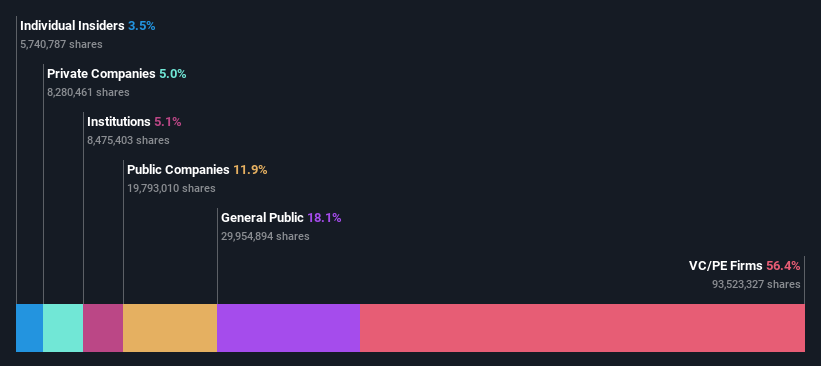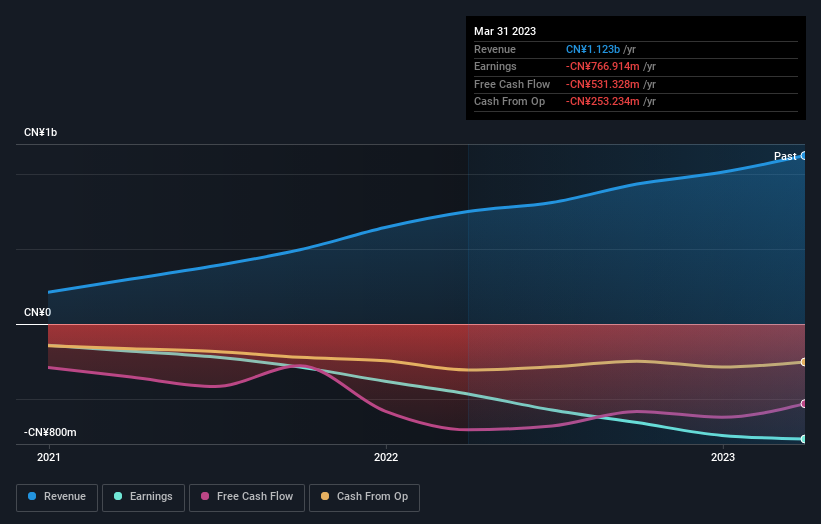While individual investors own 18% of TH International Limited (NASDAQ:THCH), private equity firms are its largest shareholders with 56% ownership
Key Insights
The considerable ownership by private equity firms in TH International indicates that they collectively have a greater say in management and business strategy
60% of the business is held by the top 2 shareholders
Past performance of a company along with ownership data serve to give a strong idea about prospects for a business
Every investor in TH International Limited (NASDAQ:THCH) should be aware of the most powerful shareholder groups. And the group that holds the biggest piece of the pie are private equity firms with 56% ownership. Put another way, the group faces the maximum upside potential (or downside risk).
Meanwhile, individual investors make up 18% of the company’s shareholders.
Let's take a closer look to see what the different types of shareholders can tell us about TH International.
Check out our latest analysis for TH International
What Does The Institutional Ownership Tell Us About TH International?
Institutions typically measure themselves against a benchmark when reporting to their own investors, so they often become more enthusiastic about a stock once it's included in a major index. We would expect most companies to have some institutions on the register, especially if they are growing.
TH International already has institutions on the share registry. Indeed, they own a respectable stake in the company. This suggests some credibility amongst professional investors. But we can't rely on that fact alone since institutions make bad investments sometimes, just like everyone does. It is not uncommon to see a big share price drop if two large institutional investors try to sell out of a stock at the same time. So it is worth checking the past earnings trajectory of TH International, (below). Of course, keep in mind that there are other factors to consider, too.
Hedge funds don't have many shares in TH International. The company's largest shareholder is Cartesian Capital Group, LLC, with ownership of 49%. Meanwhile, the second and third largest shareholders, hold 12% and 7.9%, of the shares outstanding, respectively. Furthermore, CEO Yongchen Lu is the owner of 0.9% of the company's shares.
A more detailed study of the shareholder registry showed us that 2 of the top shareholders have a considerable amount of ownership in the company, via their 60% stake.
Researching institutional ownership is a good way to gauge and filter a stock's expected performance. The same can be achieved by studying analyst sentiments. As far as we can tell there isn't analyst coverage of the company, so it is probably flying under the radar.
Insider Ownership Of TH International
The definition of an insider can differ slightly between different countries, but members of the board of directors always count. Company management run the business, but the CEO will answer to the board, even if he or she is a member of it.
I generally consider insider ownership to be a good thing. However, on some occasions it makes it more difficult for other shareholders to hold the board accountable for decisions.
Shareholders would probably be interested to learn that insiders own shares in TH International Limited. It has a market capitalization of just US$434m, and insiders have US$15m worth of shares, in their own names. Some would say this shows alignment of interests between shareholders and the board. But it might be worth checking if those insiders have been selling.
General Public Ownership
The general public-- including retail investors -- own 18% stake in the company, and hence can't easily be ignored. While this size of ownership may not be enough to sway a policy decision in their favour, they can still make a collective impact on company policies.
Private Equity Ownership
With a stake of 56%, private equity firms could influence the TH International board. Some might like this, because private equity are sometimes activists who hold management accountable. But other times, private equity is selling out, having taking the company public.
Private Company Ownership
Our data indicates that Private Companies hold 5.0%, of the company's shares. Private companies may be related parties. Sometimes insiders have an interest in a public company through a holding in a private company, rather than in their own capacity as an individual. While it's hard to draw any broad stroke conclusions, it is worth noting as an area for further research.
Public Company Ownership
Public companies currently own 12% of TH International stock. It's hard to say for sure but this suggests they have entwined business interests. This might be a strategic stake, so it's worth watching this space for changes in ownership.
Next Steps:
It's always worth thinking about the different groups who own shares in a company. But to understand TH International better, we need to consider many other factors. Case in point: We've spotted 4 warning signs for TH International you should be aware of, and 3 of them make us uncomfortable.
Of course this may not be the best stock to buy. So take a peek at this free free list of interesting companies.
NB: Figures in this article are calculated using data from the last twelve months, which refer to the 12-month period ending on the last date of the month the financial statement is dated. This may not be consistent with full year annual report figures.
Have feedback on this article? Concerned about the content? Get in touch with us directly. Alternatively, email editorial-team (at) simplywallst.com.
This article by Simply Wall St is general in nature. We provide commentary based on historical data and analyst forecasts only using an unbiased methodology and our articles are not intended to be financial advice. It does not constitute a recommendation to buy or sell any stock, and does not take account of your objectives, or your financial situation. We aim to bring you long-term focused analysis driven by fundamental data. Note that our analysis may not factor in the latest price-sensitive company announcements or qualitative material. Simply Wall St has no position in any stocks mentioned.

 Yahoo Finance
Yahoo Finance 

